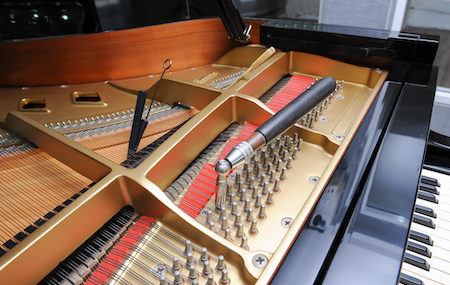One moment you play your favorite song on the piano, and it sounds beautiful. The next moment something’s off. It doesn’t sound quite right. What could be wrong?
Your piano may have slipped out of tune. Why does that happen?
Standard acoustic pianos today are made up of more than 10,000 parts. As a piano is played, as it ages and as other things impact it, it can allow your piano to slip out of tune. The reasons include:
Regular play – how did you play today? Did you touch the keys softly? Did you bang out your favorite tune? The impact of touching each key can pull the piano out of tune. Every note causes the various parts to move and come together, creating the sound you love. Over time, this takes its toll on connections, and requires adjustment to bring them back in tune.
Humidity – summer versus winter. Snow and cold versus heat and humidity. The temperature fluctuations can be wildly different from the heat of summer to the coldest day of the winter. And that brings new levels of humidity into your home. That impacts every piece of the piano, from the soundboard to the pinblock and beyond. As it swells and contracts, it will cause the piano to quickly slip out of tune. A rule of thumb is to keep your home at 40 to 50 percent humidity range.
Consistency – pianos work better when their environment has little change. That means keeping it away from direct sunlight, drafty doors and windows, and vents that blow conditioned air.
Age – new pianos have new strings that will take time to stretch and bend into place. Old pianos may have missing or broken pins that allow strings to slip out of place. Because of constant movement and change, frequency matters when tuning a piano over time.
Repairs – if your piano technician has mentioned an issue with a pinblock or soundboard on a previous tuning session, it could cause further problems with how well your piano holds a tune. Regularity is essential when keeping your piano in good condition as it ages.


